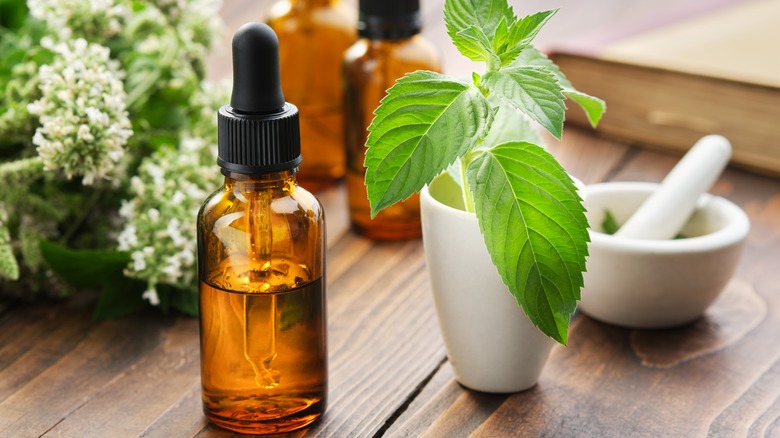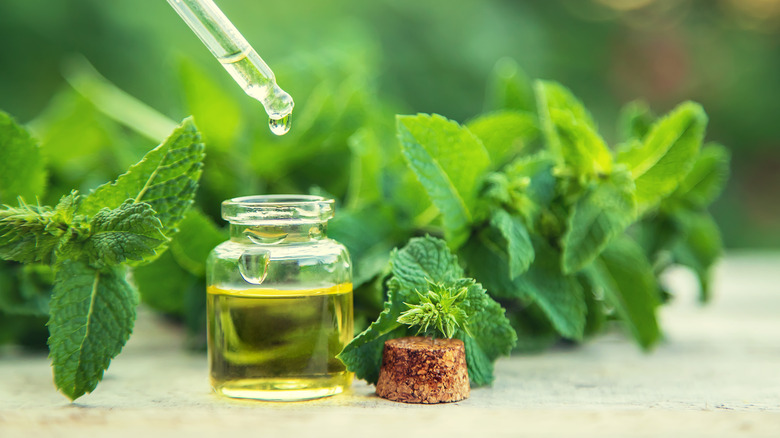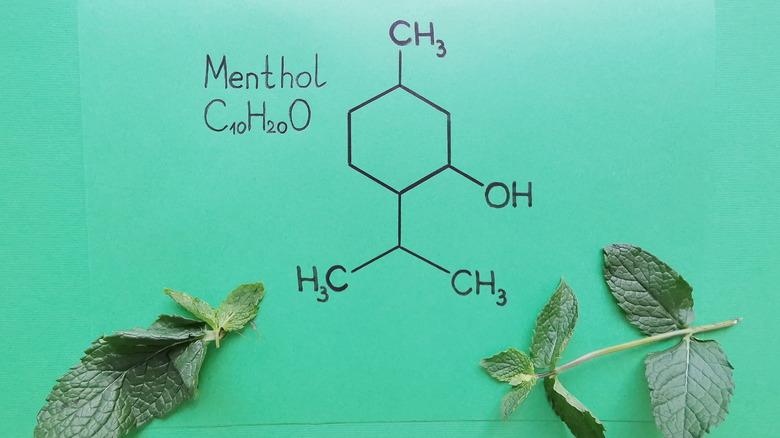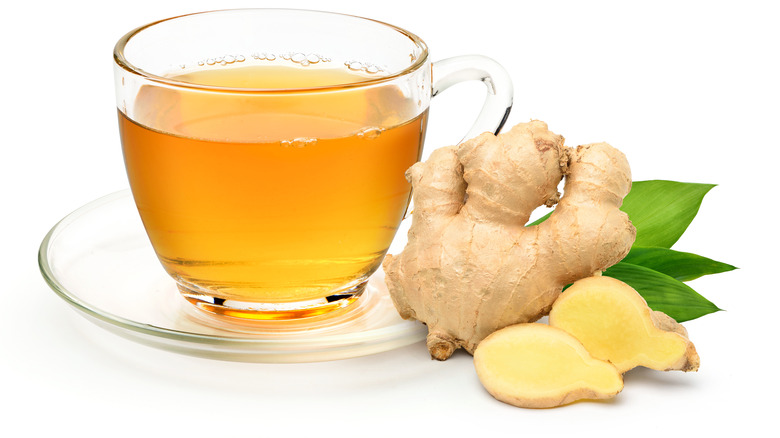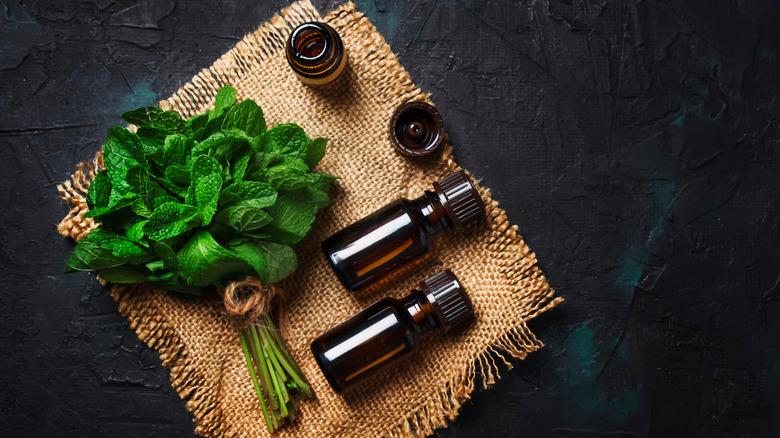9 Surprising Conditions Peppermint Can Ease
We may receive a commission on purchases made from links.
There is nothing quite like the refreshing scent of peppermint or the sweet coolness it brings to the palate. Almost everyone knows how mint can freshen breath or brighten your chewing gum, but you might be surprised to hear that peppermint has actually been used medicinally for thousands of years, according to historical records in Greece, Rome, and Egypt per Peppermint.
Scientifically speaking, peppermint is called "Mentha piperita" and is a cross between spearmint and watermint (via Mentha piperita). Although its exact place of origin is disputed, historically it was cultivated in damp areas along riverbanks and streams in both the northern and southern hemispheres, including continents like Europe, North America, and Eastern Africa (per Peppermint).
Peppermint contains several aromatic compounds – including menthone, isomenthone, and different chemical forms of menthol — that give it its characteristic sweet yet pungent scent and flavor. It can be taken in many different forms, including candies, teas, tinctures, extracts, and oils, and has several pharmacologic properties including analgesic, antimicrobial, antiparasitic, and antioxidant properties. In this article, you will discover some of the most interesting conditions that peppermint can help, many of which are not commonly known and are quite surprising.
Irritable Bowel Syndrome
According to a 2018 review published in Alimentary Pharmacology & Therapeutics, peppermint can be used to treat Irritable Bowel Syndrome (IBS) and its many symptoms, including gas, bloating, and diarrhea (per Medical News Today). The review looked at literature on peppermint oil with regards to clinical use, efficacy, metabolic effects, and safety, and found several mechanisms by which peppermint oil exerts its effects on IBS. Chief among these mechanisms was that it relaxes smooth muscle, which causes an antispasmodic effect on the digestive system, and it also exerts anti-inflammatory and anti-microbial effects.
It is known that peppermint directly affects the gallbladder, small intestine, stomach, and colon, which are known to play a role in IBS. The review concluded that there are several controlled studies evidencing the benefit of peppermint on IBS. Because peppermint has been shown to reduce muscle spasms along the digestive tract (per RxList), this may also explain its beneficial effects on IBS. Related to IBS, certain peppermint products may even help ease dyspepsia — more commonly referred to as heartburn — by decreasing stomach spasms. So the next time you feel that familiar fire in your chest or the gurgling stomach of an IBS flareup, a cup of peppermint tea may just be the thing to reach for.
Tension headaches
Many people turn to Advil or Tylenol for the occasional tension headache, but did you know peppermint may be helpful as well? According to a 2016 review, the topical application of peppermint oil can relieve tension headaches. In controlled studies, peppermint oil proved to be much more effective than a placebo. The oil composition shown to be effective was a solution of 10% peppermint essential oil dissolved in ethanol (alcohol). Additionally, a review of nearly twenty other studies showed that one of the active ingredients in peppermint, menthol, may help those who suffer from migraine headaches as well, per Medical News Today.
Dr. Sara Crystal, a neurologist and headache specialist, told Today that "Peppermint oil is one of the key essential oils that have been proven to help with headaches." She goes on to explain how the active compound in peppermint oil, menthol, works to provide pain relief through its effects on the nervous system, desensitizing pain receptors and inducing a cooling effect that reduces pain.
Some simple ways peppermint oil can be used to soothe a headache include: inhaling peppermint oil, drawing a bath with a few diluted drops added to the water, adding some drops to a cold compress and placing it over your forehead, or diluting the oil in a carrier oil, such as coconut, then gently rubbing into your forehead or temples for relief.
Dry skin and acne
Many people experience nipple discomfort when breastfeeding, including chapped or chafed nipples. Fortunately, peppermint can help, according to RxList. Research has shown that women who apply peppermint oil to their nipples experience less cracking and pain in the area.
Peppermint can help other skin conditions as well, such as acne (per Today). Dr. Debra Jaliman, a New York-based dermatologist who is also the assistant professor of dermatology at Icahn School of Medicine, told Today that "Peppermint oil naturally cleanses the skin and has antiseptic and antibacterial properties. It has a cooling effect which soothes irritation and inflammation due to acne." As acne is partly caused by bacterial growth on the skin, the antibacterial properties in peppermint oil may reduce the presence of acne-inducing bacteria on the skin's surface. That said, Dr. Joshua Zeichner, who directs cosmetic and clinical research at Mount Sinai Hospital in the dermatology department, is careful to state that someone should not rely exclusively on peppermint oil — rather, it is best used in combination with prescribed acne medications.
It is also important to note that because peppermint is an essential oil, it is potent and could worsen skin irritation if not used correctly or overused, according to cosmetic chemist Kelly Dobos (via Today). She urges people to use it only every few days to determine how your skin reacts, and to discontinue it if you notice any signs of irritation such as burning or redness.
Dry hair and brittle nails
In addition to reducing dry skin and clearing acne, peppermint oil may also help you maintain luscious locks and strong nails. According to senior hair colorist Stephanie Brown at Eddie Arthur Salon in NYC, speaking to Today, "Peppermint oil is great for your hair and scalp. It helps with dryness or itching ... it helps with dandruff because it has antiseptic and anti-inflammatory properties. It also helps strengthen hair roots which will help with hair loss." The essential oil is thought to promote hair growth by encouraging blood flow to hair follicles, increasing their supply of nutrients and oxygen. On an interesting side note, the powerful smell of menthol suffocates head lice as well, and is sometimes used to treat an infestation.
Since peppermint oil is so potent, it is best used in modest amounts and diluted when applying directly to the scalp. Stephanie Browns says, "Putting peppermint oil straight on the scalp may be too intense, so it's best to put a few drops in your shampoo or maybe make your own mask. Try peppermint oil mixed with coconut oil or hemp oil or avocado oil."
Peppermint also works as a natural cuticle softener and moisturizer since it has antifungal properties, and a solution can be easily made at home by adding a few drops of the oil into a dropper bottle and diluting with a base oil such as grape seed or olive oil.
Nausea (some forms)
Peppermint may help relieve some types of nausea, though the results and information available is mixed and far from conclusive. A 2016 study published in the journal Nursing showed that inhaling peppermint oil after a procedure reduced postoperative nausea. This is in contrast to a review of studies in 2018 that showed aromatherapy (including peppermint oil) had no effect on postoperative nausea intensity (per Healthline). Another 2012 study in the Iranian Red Crescent Med Journal looked at the effects of peppermint oil on morning sickness, which is hallmarked by nausea and vomiting in pregnancy; it also showed that peppermint essential oil did not reduce episodes of nausea or vomiting during pregnancy (though other studies have shown as much as a 41% success rate in treating morning sickness).
Most of the available evidence for peppermint for nausea is related to postoperative nausea only, and not other forms such as pregnancy or chemotherapy-induced nausea. This makes sense because nausea has many different causes, and the mechanism that reduces nausea after surgery may not work for other conditions that are driven by other factors.
Stress and anxiety
Have you been feeling stressed and anxious lately? Peppermint may help. A trial done to assess the effects of peppermint aromatherapy on anxiety levels before a medical procedure (cardiac catheterization) showed promising results (via Journal of Pain Research). Although catheterization is not a major procedure, it does involve the drawing of a catheter through a blood vessel into the heart to help treat or identify various heart conditions like cardiac arrhythmias or blocked arteries (per Mayo Clinic), and could understandably induce anxiety and some pain (though usually mild). The study involved eighty cardiac patients who were randomly assigned to either a treatment group (received aromatherapy) or control group (received distilled water inhalation). The treatment group was instructed to inhale peppermint oil. The study concluded that there was a statistically significant reduction in pain and anxiety severity in the aromatherapy group compared to the control groups.
You might be curious just how peppermint aromatherapy reduces pain and anxiety. Well, it turns out there were several mechanisms identified in the study. Peppermint contains several analgesic (pain-relieving) compounds such as limonene, menthol, and carvone. Menthol, for instance, interacts with opioid receptors in the brain, which are known for soothing pain. Inhaling aroma components like peppermint is also known to stimulate endorphin release, accentuating its pain-relieving and anxiety-reducing effects. Peppermint may also work to lower stress and anxiety by boosting serotonin output and suppressing cortisol release.
Sinus pressure and congestion
No one enjoys the sinus pressure and congestion that comes with a cold or sinus infection, so many turn to nasal decongestant drugs like Sudafed for relief, but you might be surprised to learn that peppermint oil may also ease these bothersome symptoms. But how? Firstly, peppermint works at the immune level, fighting the viruses and bacteria that may lead to sinus infections in the first place due to its antimicrobial and anti-inflammatory properties, according to Healthline. This could in turn explain its beneficial effects on sinus congestion.
In addition to peppermint's immune-boosting benefits, menthol — one of the many active compounds in peppermint — may increase airflow through the nasal cavities when the steam of peppermint tea is inhaled, giving the perception of literally breathing easier. While there isn't much evidence backing peppermint's direct effects on sinus congestion, we do know that the vapors released from warm liquids like broth or tea can temporarily offset nasal congestion, so it certainly may not hurt to inhale a warm mug of peppermint tea the next time you're feeling a bit stuffy.
Achy muscles
The next time your muscles feel tight and achy after a long, active day, you might consider adding a few drops of peppermint oil to a warm bath or cold compress to soothe your aches and pains. Peppermint has natural anesthetic properties due to the presence of menthol, Healthline states. Not only does menthol exert a pleasant cooling sensation on warm, tender muscles, but it also has antispasmodic and anti-inflammatory properties, helping to soothe those sore sinews further.
A review article published in the Asian Pacific Journal of Tropical Biomedicine also confirmed many of peppermint oil's beneficial anti-inflammatory and antispasmodic properties on muscles, and the authors attribute most of the pharmacological properties of peppermint oil to the presence of menthol (per Medical News Today). Since peppermint also has vasoconstrictive properties, meaning it causes blood vessels to shrink and constricts blood flow to a degree, this may explain in part why it reduces swelling.
Sore throats
A sore throat is no fun, and many people turn to lozenges or candies to soothe their sore, scratchy throats when dealing with a cold. Interestingly, the active ingredient in most lozenges and medicinal candies designed for sore throats is menthol, the same active ingredient found in peppermint (via Arabian Journal of Chemistry). So peppermint candy or peppermint tea may work in place of a medicinal lozenge if you have some on hand. And in addition, the antimicrobial properties of peppermint that help sinus congestion may also help to ease a sore throat by targeting the viruses and bacteria that may be contributing to infection.
In fact, a 2015 study published in the Arabian Journal of Chemistry stated that "the distilled concentrations of essential oil inhibited the growth of microorganisms and the results were comparable with those of antibiotic gentamycin. Essential oils showed a wider spectrum of activity but less strong inhibition as compared to the investigated commercial antibiotic." This means that peppermint essential oil may be similar in strength to certain broad-spectrum antibiotics, such as gentamycin. Of course, peppermint is not a substitute for medical treatment or medication prescribed by your doctor, but it may help ease your symptoms when combined with these measures.
How to brew peppermint tea
There are many ways to add peppermint to your medicinal arsenal. Brewing peppermint tea is among the easiest and most useful, and it can be used for easing many conditions such as sore throats, sinus congestion, a sour stomach, or IBS symptoms (via Medical News Today). There are two main ways to prepare peppermint tea: loose leaf or tea bag. One is no better than the other, so it really comes down to personal preference. To brew loose leaf peppermint tea, follow these simple steps according to Food: Boil 3-4 cups of water in a pot, add ½ cup dried peppermint leaves, and turn off the heat. Let the peppermint leaves steep for five minutes before straining into a large bowl. Add honey to flavor to your liking, and pour your peppermint tea into cups.
You can either drink the tea hot or add ice cubes if you prefer a cold brew, though hot tea works better for sinus and cold-related symptoms because of their warm vapors (via Healthline). Wild peppermint can often be found growing along streams, creeks, and rivers, per Food, but you should use caution and only pick it if you are certain it is peppermint and know that the area is free of pollutants. Even so, the leaves should be thoroughly washed before use.
To prepare peppermint tea using a tea bag, simply follow the instructions on the back of the box, which will usually involve heating water via stovetop or microwave to a gentle boil then letting the tea bag steep for a few minutes before removing, flavoring, and drinking.
How to use peppermint oil
Peppermint oil works well for sore muscles and skin conditions, as it can be applied topically per Today. According to Healthline, be sure to choose a safe oil, which is one manufactured by a company that is part of the National Association of Holistic Aromatherapy. In addition, you should look for national origin, expiration dates, and other botanical information on the bottle's label.
When using peppermint oil for a sore throat, methods such as steam inhalation work well. Add about 7 drops of oil to 2 cups of boiling water, place a towel over your face, and inhale the steam through the towel, with your eyes shut. You can also try diffusion, where you add several drops of oil to a room diffuser, allowing the vaporized oil to fill the room with its aroma. The oil can also be applied topically to the throat by adding 7-10 drops of essential oil to 2 tablespoons of base oil, like coconut, and then dabbing the mixed oils directly on the exterior of your throat. Do not ingest the oil or apply to your skin before diluting with a carrier oil, as it will be too strong.
For sore muscles, dilute 4-10 drops of peppermint oil in a carrier oil and add to a warm bath after it's finished running. Soak for at least fifteen minutes for the oil to take full effect, per Base Formula. You can also prepare a cold compress for achy muscles by adding a few drops of diluted peppermint oil onto a cold, damp washcloth and placing it on the affected area (per Food).
Precautions and safety
Although peppermint may help some conditions, you should still be careful and ask your doctor about using peppermint if you are pregnant or breastfeeding, as it may not be safe for certain populations such as children, and little is known about its effects in pregnancy per the National Center for Complementary and Integrative Health.
Aromatherapy may also be toxic in some pets, per Healthline. Peppermint oil should also never be taken internally. In large doses, it is toxic. Because peppermint oil is so strong and concentrated, it should always be diluted with a carrier oil before use. The ideal ratio is a few drops of peppermint essential oil per ounce of carrier oil. Even so, test the oil on a small area of skin before applying to larger areas to see how your skin reacts. If you develop a rash or redness, do not use the oil, or ask your doctor if you can try diluting it further.
Drug interactions and contraindications
Though it can provide a slew of potential benefits, peppermint oil interacts with certain drugs, so it is important to talk with your doctor before using it if you are on prescription medications, according to Healthline. Some of the medications peppermint interacts with include cyclosporine, lovastatin, and ketoconazole. By decreasing or increasing the effects of these medications, a peppermint cross-interaction may have potentially serious consequences.
According to RxList, someone with a history of hiatal hernia should use with caution. Peppermint oil must also be avoided in infants, children, and people with a condition known as achlorhydria, where there is an absence of hydrochloric acid in the stomach.
Side effects and allergic reactions are also possible, and you should stop using peppermint and contact your doctor immediately if you experience any unusual symptoms such as burning sensation, diarrhea, flushing, mouth ulcers, rash, skin irritation, or difficulty breathing.
